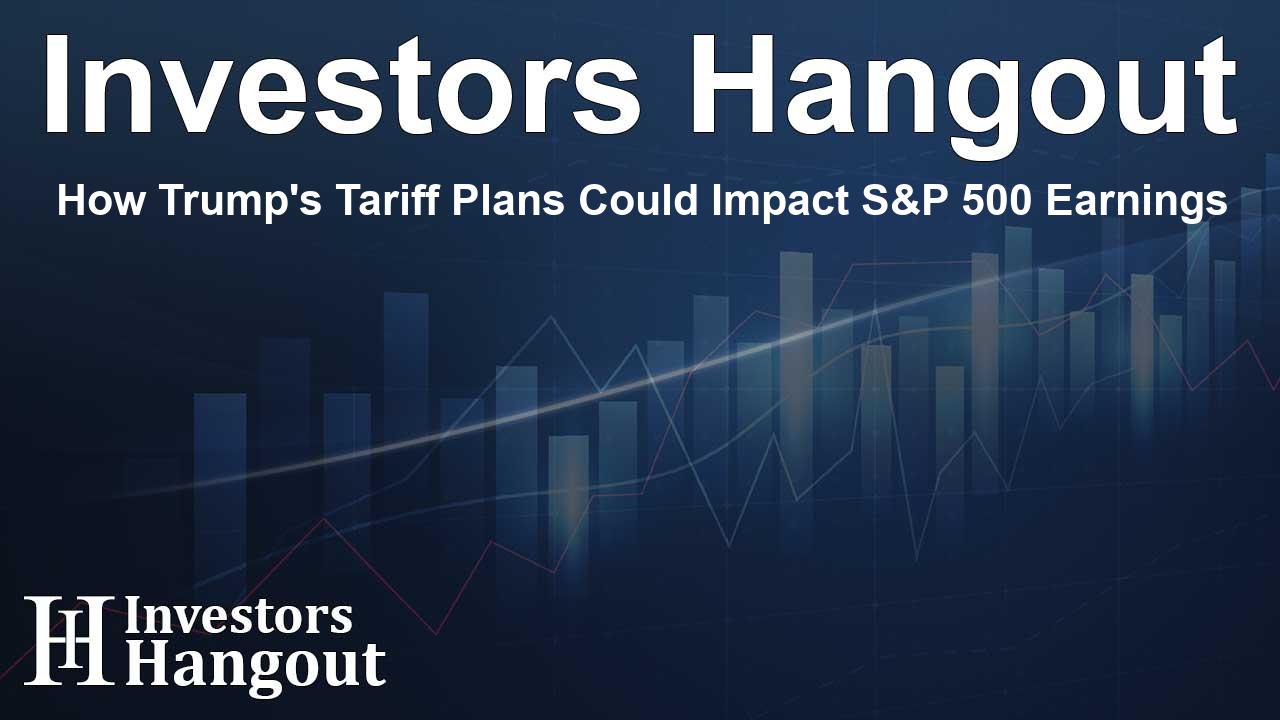How Trump's Tariff Plans Could Impact S&P 500 Earnings

Impact of Trump's Tariff Proposals on S&P 500 Earnings
Analysts at Barclays have recently shared insights regarding Republican candidate Donald Trump's tariff proposals, predicting that if implemented, these measures could negatively influence earnings for companies listed in the S&P 500.
Trump's ambitious plans involve imposing substantial tariffs on imported goods, estimated at $3 trillion. This includes proposed levies ranging from 10% to 20% on all foreign products and a staggering 60% tax specifically targeting Chinese imports.
The Reasons Behind the Tariffs
During his campaign, Trump has emphasized that these tariffs aim to safeguard working-class jobs and address perceived unfair trade practices by other nations. He focuses especially on countries with which the U.S. has a significant trade deficit, notably China and members of the European Union.
Potential Economic Ramifications
According to recent media reports, the funds generated through these tariffs, projected to amount to trillions of dollars, might be used to alleviate the financial impact of the broad corporate tax cuts that Trump has also proposed.
Barclays analysts highlighted that the projected tariffs could impose a 3.2% decrease in S&P 500 earnings in the upcoming year. An additional 1.5% decline could occur if other nations respond with countermeasures.
Understanding the Effects
The analysts noted, "While the direct impact seems modest, second-order effects from a combination of higher prices and lower-growth shocks that tariffs imply could act as an incremental headwind to corporate earnings." This insight underscores the complex nature of economic interactions in a global market.
Sectors at Risk
Some sectors are likely to feel the brunt of these potential tariffs more than others. Barclays identified materials, discretionary, industrials, technology, and healthcare as the most vulnerable sectors, primarily due to their reliance on global supply chains for production and distribution.
Political Climate and Its Influence
The political landscape remains intense, especially following a pivotal presidential debate between Trump and his Democratic opponent, Kamala Harris, recent polls indicate a close race, with Harris having a slight advantage in national figures. However, the state of the race is highly competitive in key swing states.
Regardless of the election's outcome, Barclays believes that the U.S. Congress may remain divided at least initially for either candidate's administration. This division could force the newly elected president to utilize executive and regulatory powers to implement policies without the need for legislative processes.
Exercising Presidential Authority
One area where the president holds significant power is in setting tariffs, allowing swift actions that can have immediate implications for the economy. This authority may enable decisive moves without waiting for Congressional approval.
Frequently Asked Questions
What is the proposed tariff rate by Trump?
The proposed tariffs range from 10% to 20% on all foreign goods, with specific items from China facing up to a 60% tax.
How could these tariffs affect S&P 500 earnings?
Analysts estimate that these tariffs could result in a 3.2% decline in S&P 500 earnings for the following year, plus additional losses from potential retaliatory measures by other countries.
Which sectors are most vulnerable to these tariffs?
Barclays identified the materials, discretionary, industrials, technology, and healthcare sectors as being most at risk due to their reliance on global supply chains.
What might the generated tariff funds be used for?
The funds raised from the tariffs could potentially offset costs associated with Trump's proposed corporate tax cuts.
How does the political environment affect tariff implementation?
The political landscape, characterized by a divided Congress, could lead the president to rely on executive actions to implement policies without needing legislative approval.
About The Author
Contact Caleb Price privately here. Or send an email with ATTN: Caleb Price as the subject to contact@investorshangout.com.
About Investors Hangout
Investors Hangout is a leading online stock forum for financial discussion and learning, offering a wide range of free tools and resources. It draws in traders of all levels, who exchange market knowledge, investigate trading tactics, and keep an eye on industry developments in real time. Featuring financial articles, stock message boards, quotes, charts, company profiles, and live news updates. Through cooperative learning and a wealth of informational resources, it helps users from novices creating their first portfolios to experts honing their techniques. Join Investors Hangout today: https://investorshangout.com/
The content of this article is based on factual, publicly available information and does not represent legal, financial, or investment advice. Investors Hangout does not offer financial advice, and the author is not a licensed financial advisor. Consult a qualified advisor before making any financial or investment decisions based on this article. This article should not be considered advice to purchase, sell, or hold any securities or other investments. If any of the material provided here is inaccurate, please contact us for corrections.
